
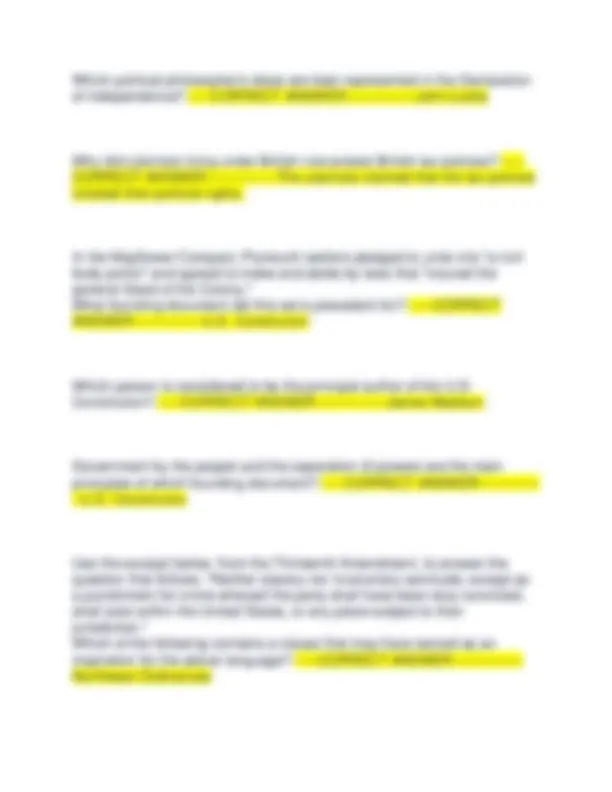
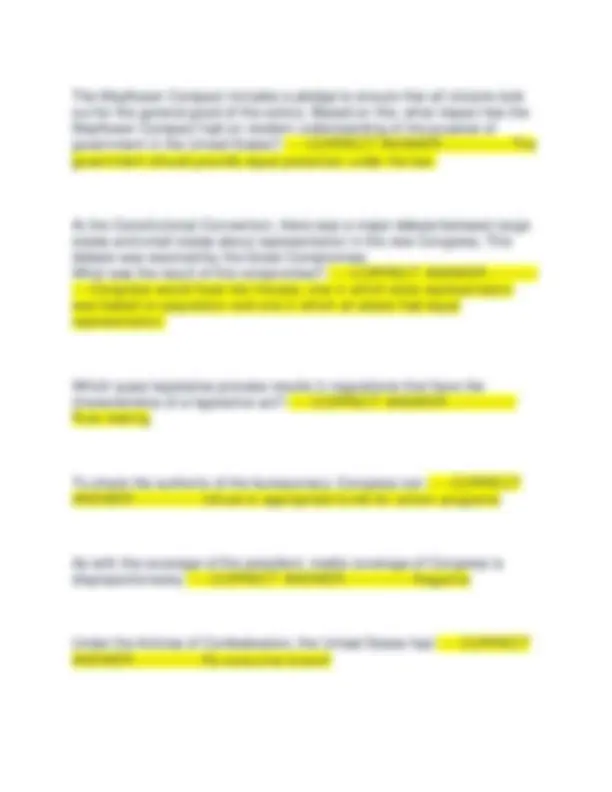
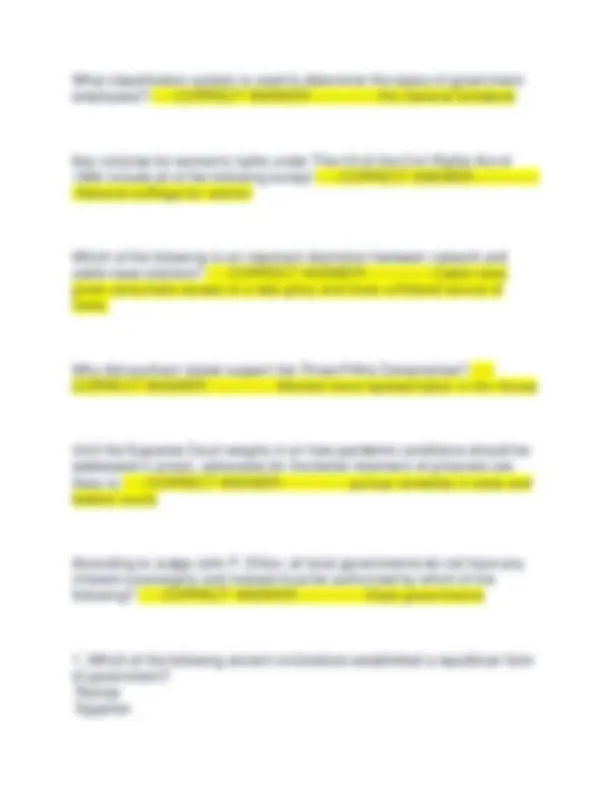
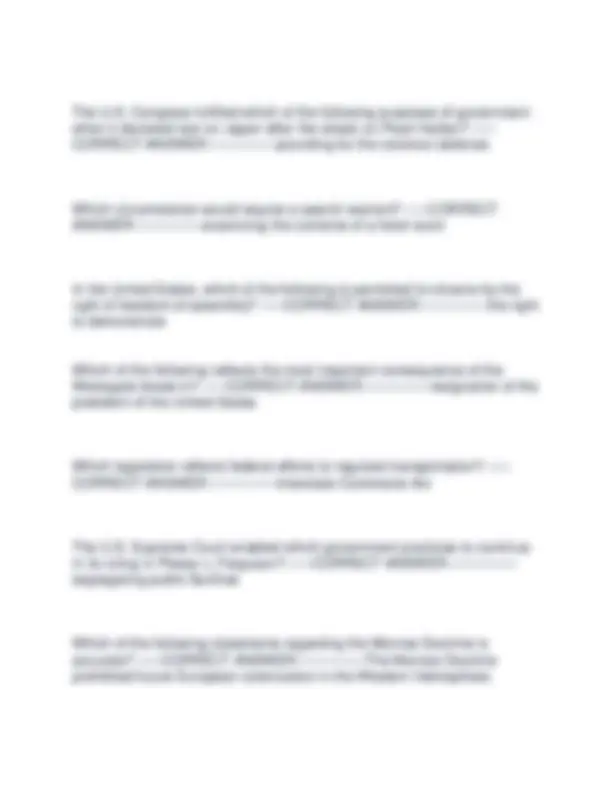
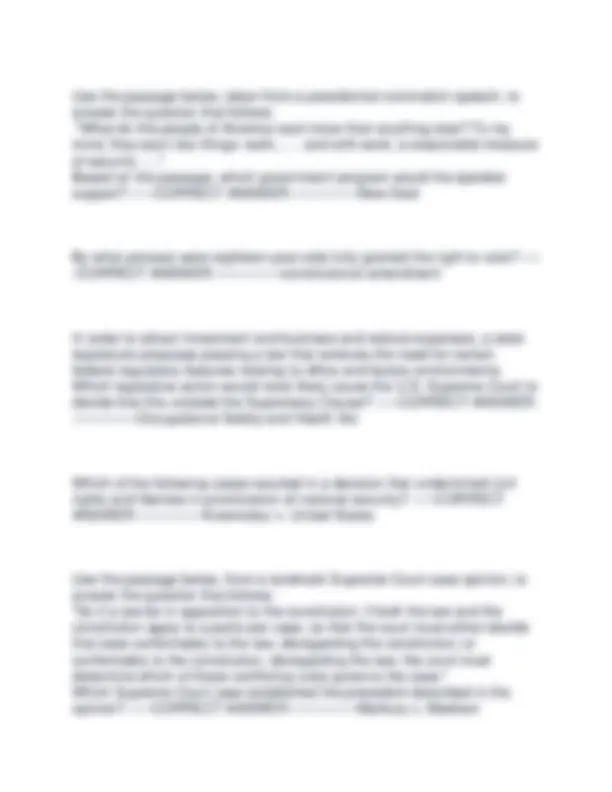
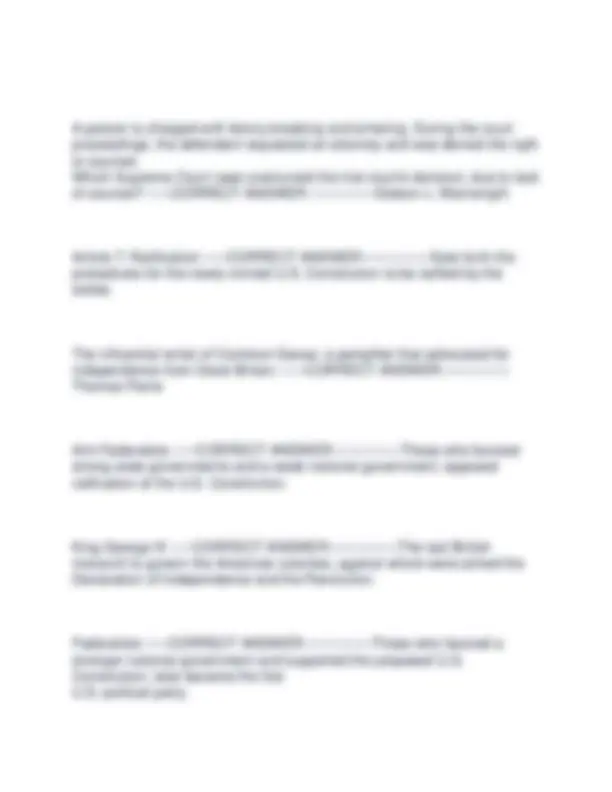
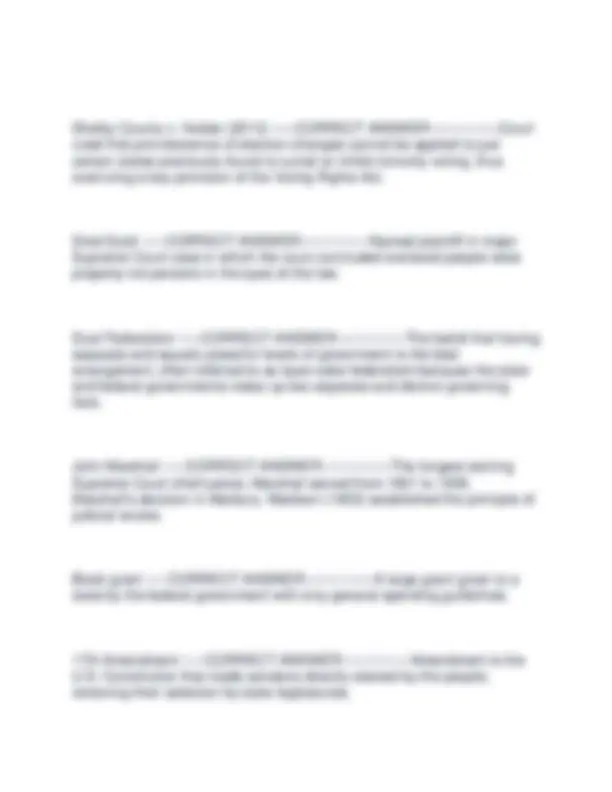
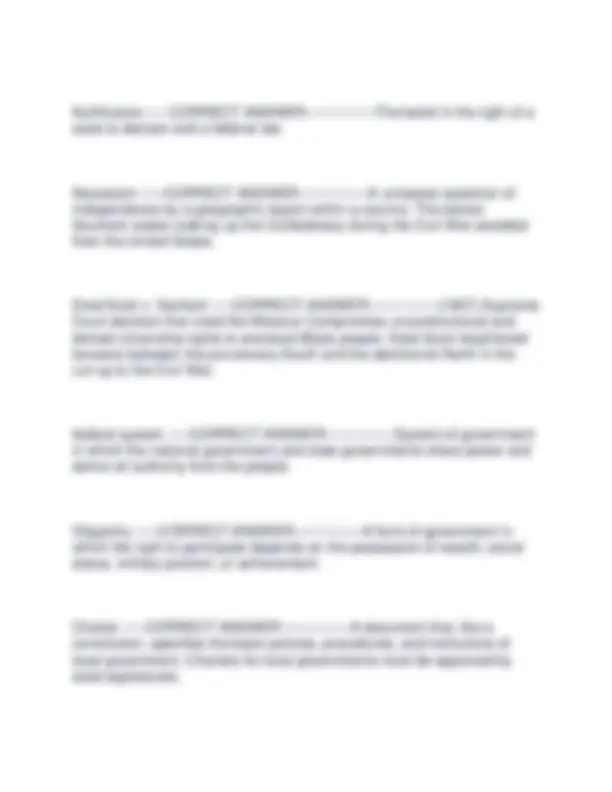
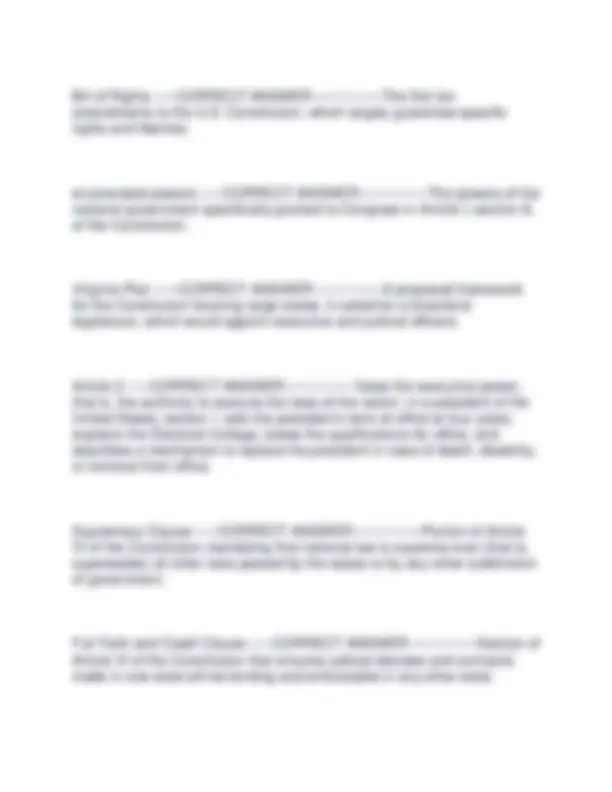
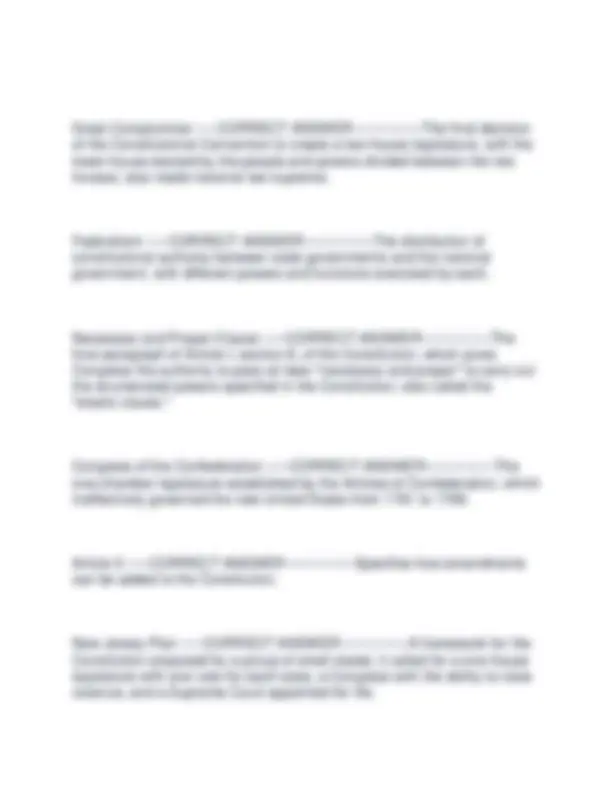
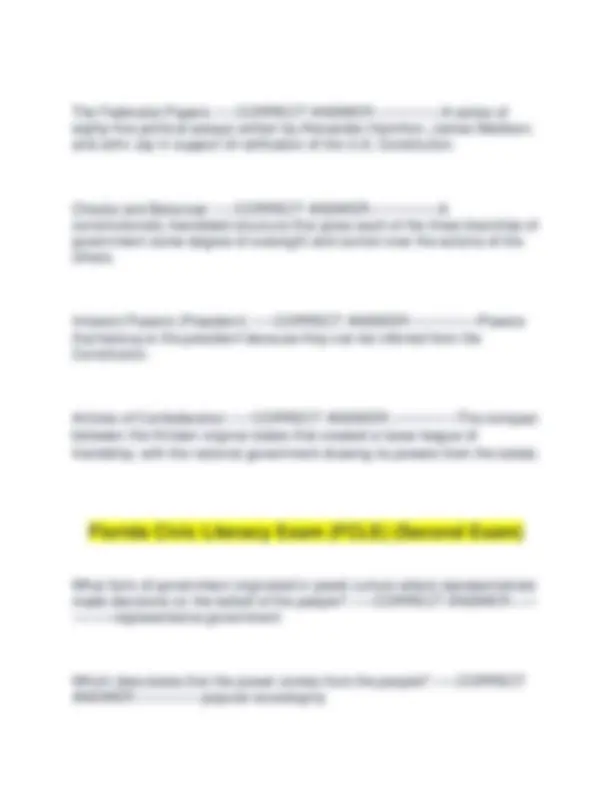
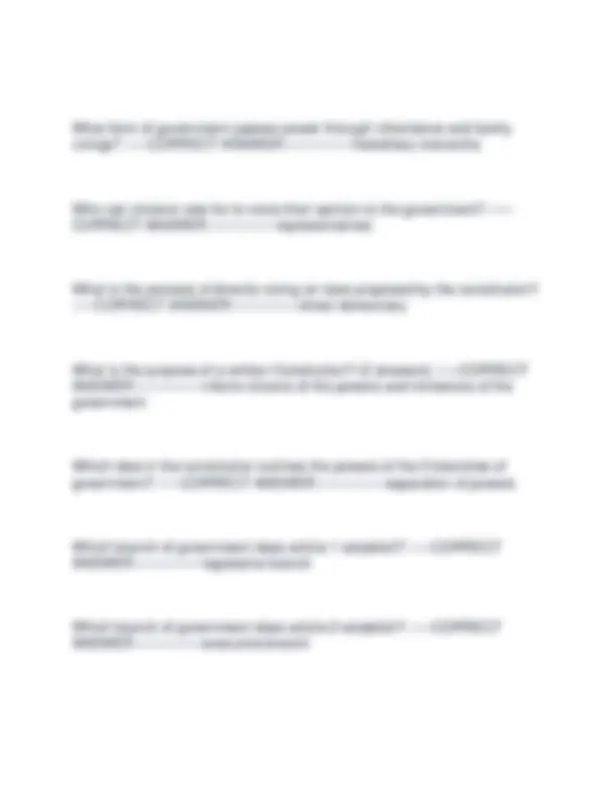
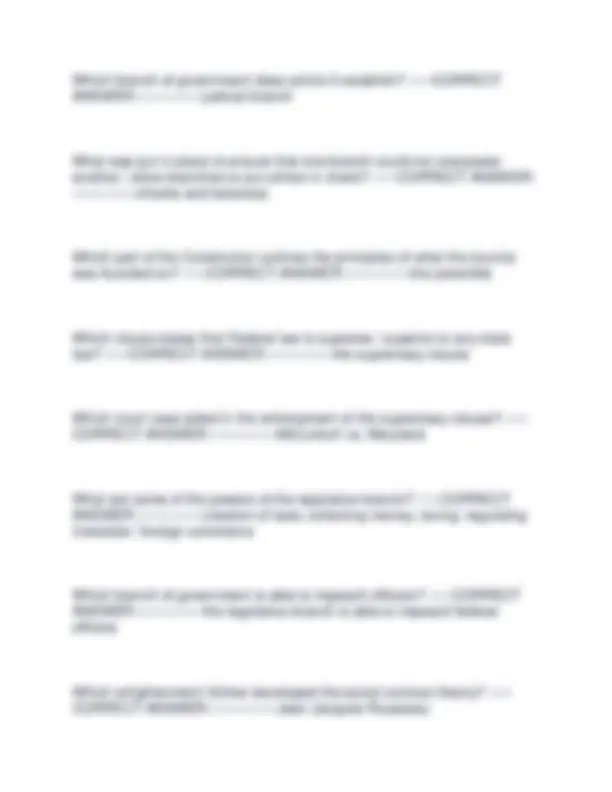
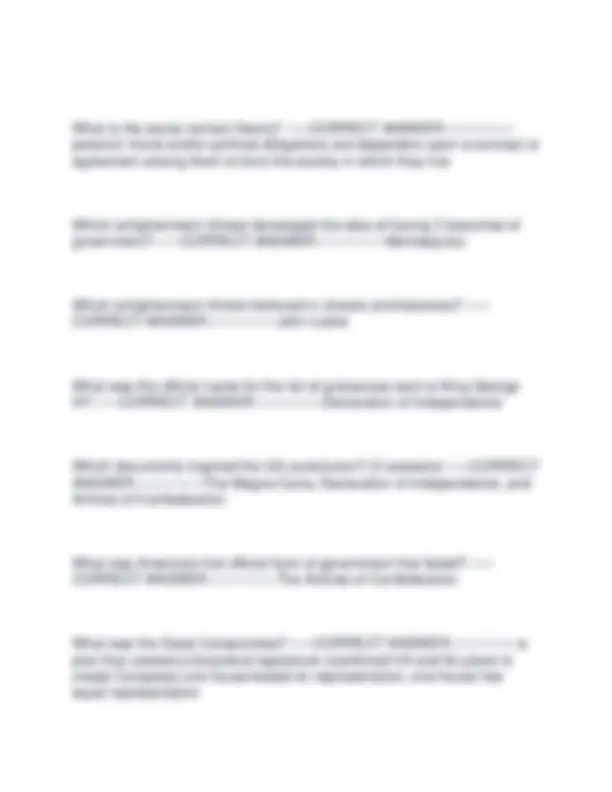
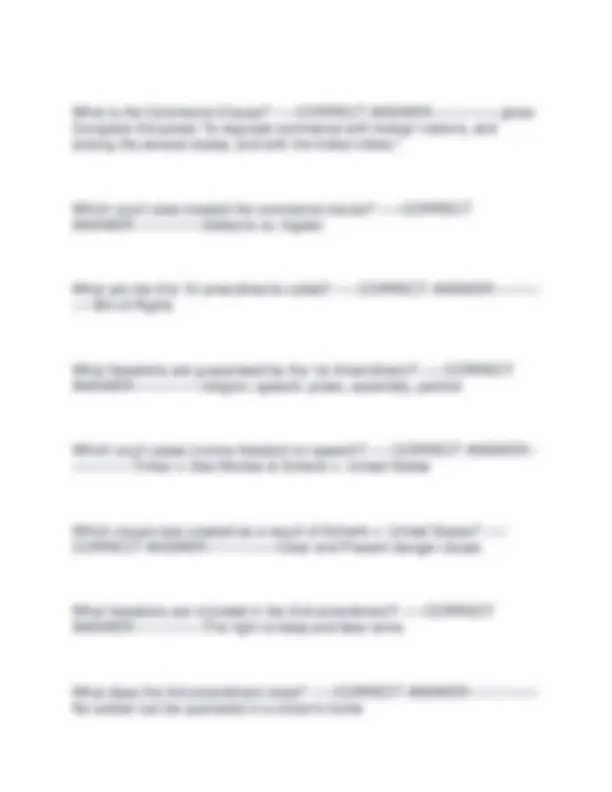
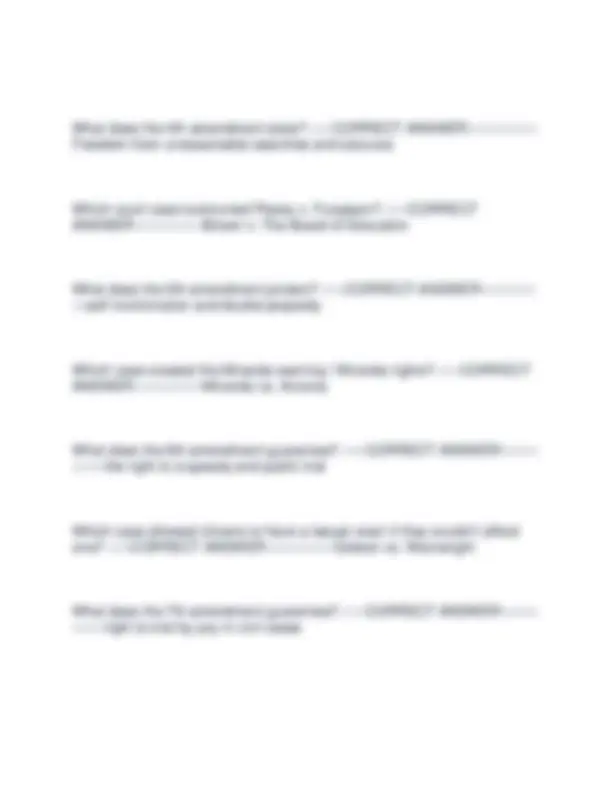
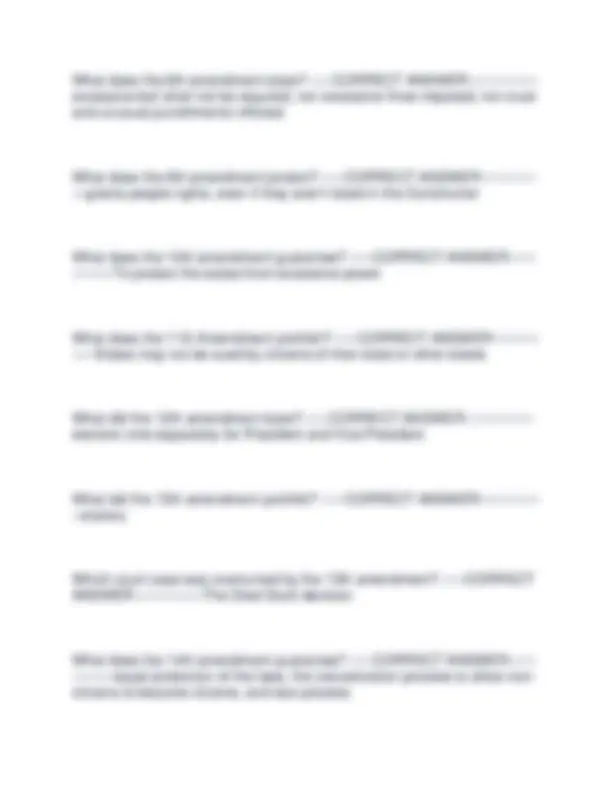
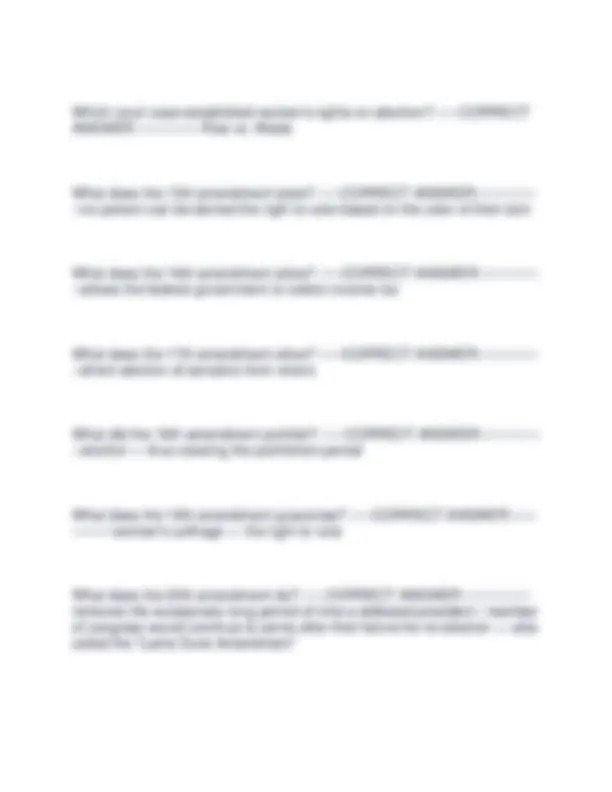
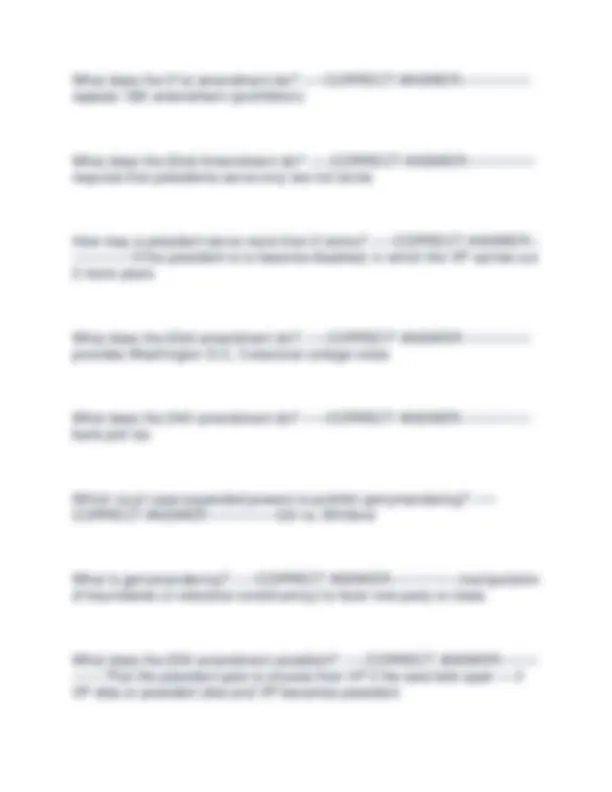
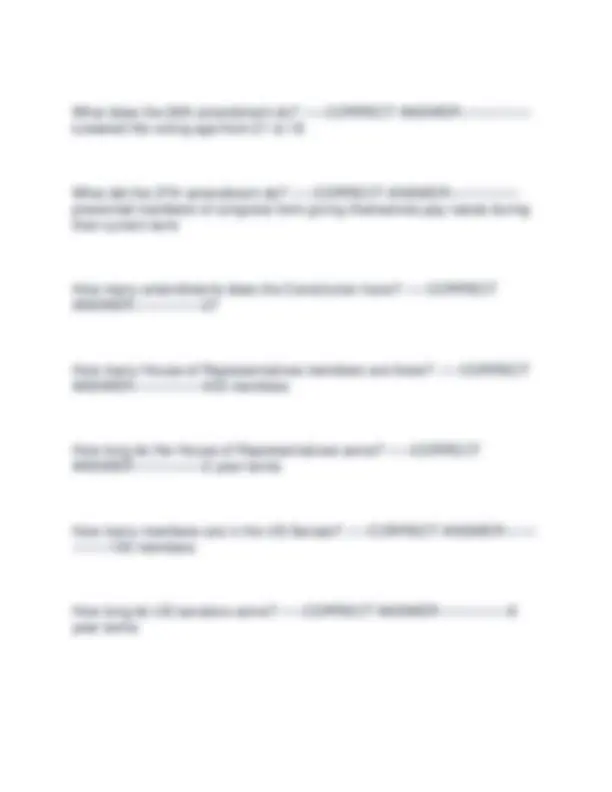
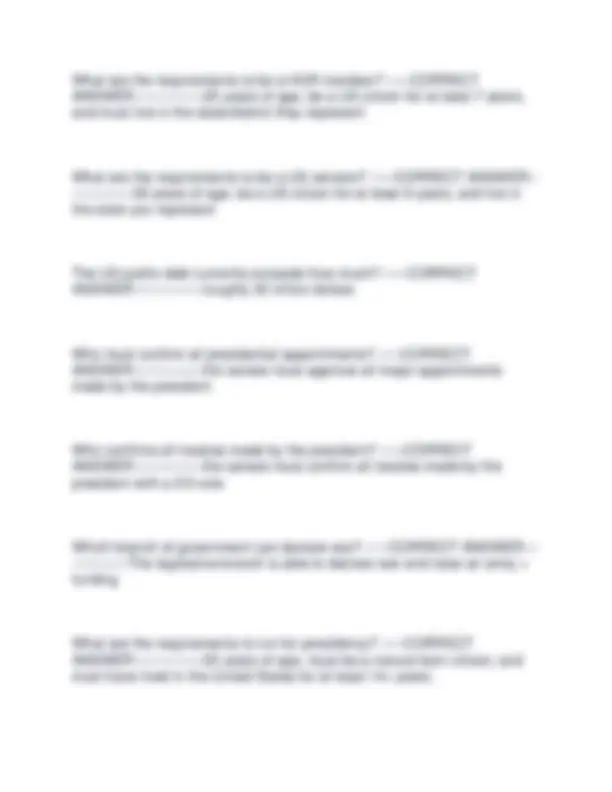
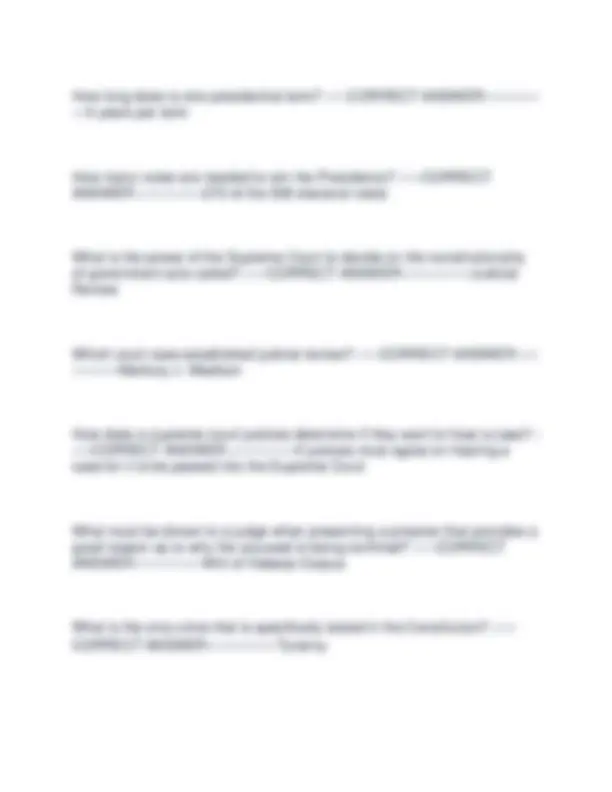


Study with the several resources on Docsity

Earn points by helping other students or get them with a premium plan


Prepare for your exams
Study with the several resources on Docsity

Earn points to download
Earn points by helping other students or get them with a premium plan
Community
Ask the community for help and clear up your study doubts
Discover the best universities in your country according to Docsity users
Free resources
Download our free guides on studying techniques, anxiety management strategies, and thesis advice from Docsity tutors
Answers to various questions related to the resolution of conflicts between state and federal laws in the us, the impact of the mayflower compact on modern government understanding, and the characteristics of certain forms of government. It also covers topics such as the role of congress in checking bureaucratic authority, media coverage of congress, the articles of confederation, and the principles of popular sovereignty and the rule of law.
Typology: Exams
1 / 30

This page cannot be seen from the preview
Don't miss anything!























A man is walking down a public street window-shopping. A robbery is reported in that same area. Police officers stop and search the man who is shopping. On what Constitutional grounds could this man contest this search as a violation of his rights? -----CORRECT ANSWER--------------- Fourth Amendment In the United States, how are conflicts between state laws and federal laws generally resolved? -----CORRECT ANSWER---------------The conflict must be resolved using the Supremacy Clause Which article of the U.S. Constitution grants the power to coin money, make treaties, and levy import duties? -----CORRECT ANSWER--------------- Article I A suspect is accused of a crime in one state and flees to another state where they are apprehended. The state is very slow in returning the suspect to the state of origin and keeps them imprisoned. Which of the following represents a suitable petition for the suspect in this situation, in regard to their constitutional rights? -----CORRECT ANSWER-- -------------petition for a writ of habeas corpus
Which phrase best describes the power of impeachment? -----CORRECT ANSWER---------------the ability of the U.S. House to charge federal officers with a crime or violation "He has kept among us, in times of peace, Standing Armies without the Consent of our legislatures." Which constitutional provision was inspired by the above complaint? ----- CORRECT ANSWER---------------The Third Amendment limits the quartering of soldiers to specific circumstances. Use the passage below, from a historical document, to answer the question that follows. "We the People of the United States, in Order to form a more perfect Union, establish Justice, insure domestic Tranquility, provide for the common defence, promote the general Welfare, and secure the Blessings of Liberty to ourselves and our Posterity, do ordain and establish this Constitution for the United States of America." Which philosophical movement best reflects the ideals in the passage? ----- CORRECT ANSWER---------------Enlightenment Use the passage below, which was included in the Declaration of Sentiments adopted at the Seneca Falls Convention in 1848, to answer the question that follows. We hold these truths to be self-evident: that all men and women are created equal; that they are endowed by their Creator with certain inalienable rights; that among these are life, liberty, and the pursuit of happiness. Which of the following documents influenced the aims and strategies of the authors of the Declaration of Sentiments? -----CORRECT ANSWER---------- -----Declaration of Independence
The Mayflower Compact includes a pledge to ensure that all citizens look out for the general good of the colony. Based on this, what impact has the Mayflower Compact had on modern understanding of the purpose of government in the United States? -----CORRECT ANSWER---------------The government should provide equal protection under the law. At the Constitutional Convention, there was a major debate between large states and small states about representation in the new Congress. This debate was resolved by the Great Compromise. What was the result of this compromise? -----CORRECT ANSWER----------- ----Congress would have two houses, one in which state representation was based on population and one in which all states had equal representation. Which quasi-legislative process results in regulations that have the characteristics of a legislative act? -----CORRECT ANSWER--------------- Rule making To check the authority of the bureaucracy, Congress can -----CORRECT ANSWER---------------refuse to appropriate funds for certain programs As with the coverage of the president, media coverage of Congress is disproportionately -----CORRECT ANSWER---------------Negative Under the Articles of Confederation, the United States had -----CORRECT ANSWER---------------No executive branch
What classification system is used to determine the salary of government employees? -----CORRECT ANSWER---------------the General Schedule Key victories for women's rights under Title VIl of the Civil Rights Act of 1964 include all of the following except -----CORRECT ANSWER--------------
Which modern process would be supported by the ancient Greeks? ----- CORRECT ANSWER---------------electing governors Laws against defamation, including libel and slander, property damage and breach of contract represent which legal concern underlying most Western nations? -----CORRECT ANSWER---------------civil law Use the passage below, from an exchange between former president Nixon and a television interviewer, to answer the question that follows. 'Well, when the president does it, that means that it is not illegal"--Richard M. Nixon Which constitutional principle does the statement from President Nixon contradict? -----CORRECT ANSWER---------------Rule of law Which form of government is based on popular sovereignty? ----- CORRECT ANSWER---------------republic Use the provided Preamble to the United States Constitution to answer the question. "We the People of the United States, in Order to form a more perfect Union, establish Justice, insure domestic Tranquility, provide for the common defence, promote the general Welfare, and secure the Blessings of Liberty to ourselves and our Posterity, do ordain and establish this Constitution for the United States of America." Which of the following statements best describes the Preamble of the U.S. Constitution? -----CORRECT ANSWER---------------Governments are accountable to the citizens over whom they rule
The U.S. Congress fulfilled which of the following purposes of government when it declared war on Japan after the attack on Pearl Harbor? ----- CORRECT ANSWER---------------providing for the common defense Which circumstance would require a search warrant? -----CORRECT ANSWER---------------examining the contents of a hotel room In the United States, which of the following is permitted to citizens by the right of freedom of assembly? -----CORRECT ANSWER---------------the right to demonstrate Which of the following reflects the most important consequence of the Watergate break-in? -----CORRECT ANSWER---------------resignation of the president of the United States Which legislation reflects federal efforts to regulate transportation? ----- CORRECT ANSWER---------------Interstate Commerce Act The U.S. Supreme Court enabled which government practices to continue in its ruling in Plessy v. Ferguson? -----CORRECT ANSWER--------------- segregating public facilities Which of the following statements regarding the Monroe Doctrine is accurate? -----CORRECT ANSWER---------------The Monroe Doctrine prohibited future European colonization in the Western Hemisphere.
A person is charged with felony breaking and entering. During the court proceedings, the defendant requested an attorney and was denied the right to counsel. Which Supreme Court case overturned the trial court's decision, due to lack of counsel? -----CORRECT ANSWER---------------Gideon v. Wainwright Article 7: Ratification -----CORRECT ANSWER---------------Sets forth the procedures for the newly minted U.S. Constitution to be ratified by the states. The influential writer of Common Sense, a pamphlet that advocated for independence from Great Britain. -----CORRECT ANSWER--------------- Thomas Paine Anti-Federalists -----CORRECT ANSWER---------------Those who favored strong state governments and a weak national government; opposed ratification of the U.S. Constitution. King George III -----CORRECT ANSWER---------------The last British monarch to govern the American colonies, against whom were aimed the Declaration of Independence and the Revolution. Federalists -----CORRECT ANSWER---------------Those who favored a stronger national government and supported the proposed U.S. Constitution; later became the first U.S. political party.
Confederate States of America -----CORRECT ANSWER---------------The 11 U.S. states, also called "the Confederacy," that attempted to secede from the Union but lost the Civil War and afterward were reintegrated into the Union. Gibbons v. Ogden (1824) -----CORRECT ANSWER---------------Supreme Court ruling that upheld broad congressional power to regulate interstate commerce. The Court's broad interpretation of the Constitution's commerce clause paved the way for later rulings upholding expansive federal powers. reserved powers -----CORRECT ANSWER---------------Powers reserved to the states by the Tenth Amendment that lie at the foundation of a state's right to legislate for the public health and welfare of its citizens. Aristocracy -----CORRECT ANSWER---------------A government in which a small group of individuals govern for the perceived good of all. Barron v. Baltimore (1833) -----CORRECT ANSWER---------------Supreme Court ruling that, before the Civil War, limited the applicability of the Bill of Rights to the federal government and not to the states. McCulloch v. Maryland (1819) -----CORRECT ANSWER--------------- Supreme Court ruling that upheld the power of the national government and denied the right of a state to tax the federal bank, using the Constitution's supremacy clause
Shelby County v. Holder (2013) -----CORRECT ANSWER---------------Court ruled that pre-clearance of election changes cannot be applied to just certain states previously found to curtail or inhibit minority voting, thus overruling a key provision of the Voting Rights Act. Dred Scott -----CORRECT ANSWER---------------Named plaintiff in major Supreme Court case in which the court concluded enslaved people were property-not persons in the eyes of the law. Dual Federalism -----CORRECT ANSWER---------------The belief that having separate and equally powerful levels of government is the best arrangement, often referred to as layer-cake federalism because the state and federal governments make up two separate and distinct governing tiers. John Marshall -----CORRECT ANSWER---------------The longest-serving Supreme Court chief justice, Marshall served from 1801 to 1835. Marshall's decision in Marbury. Madison (1803) established the principle of judicial review. Block grant -----CORRECT ANSWER---------------A large grant given to a state by the federal government with only general spending guidelines. 17th Amendment -----CORRECT ANSWER---------------Amendment to the U.S. Constitution that made senators directly elected by the people, removing their selection by state legislatures.
Nullification -----CORRECT ANSWER---------------The belief in the right of a state to declare void a federal law. Secession -----CORRECT ANSWER---------------A unilateral assertion of independence by a geographic region within a country. The eleven Southern states making up the Confederacy during the Civil War seceded from the United States. Dred Scott v. Sanford -----CORRECT ANSWER---------------(1857) Supreme Court decision that ruled the Missouri Compromise unconstitutional and denied citizenship rights to enslaved Black people. Dred Scott heightened tensions between the pro-slavery South and the abolitionist North in the run-up to the Civil War. federal system -----CORRECT ANSWER---------------System of government in which the national government and state governments share power and derive all authority from the people. Oligarchy -----CORRECT ANSWER---------------A form of government in which the right to participate depends on the possession of wealth, social status, military position, or achievement. Charter -----CORRECT ANSWER---------------A document that, like a constitution, specifies the basic policies, procedures, and institutions of local government. Charters for local governments must be approved by state legislatures.
John Jay -----CORRECT ANSWER---------------A member of the Founding generation who was the first Chief Justice of the United States. A diplomat and co-author of TheFederalist Papers. Electoral College -----CORRECT ANSWER---------------The system established by the Constitution through which the president is chosen by electors from each state, which has as many electoral votes as it has members of Congress. Mercantilism -----CORRECT ANSWER---------------An economic theory designed to increase a nation's wealth through the development of commercial industry and a favorable balance of trade. Montesquieu -----CORRECT ANSWER---------------French political philosopher who advocated the separation of executive and legislative and judicial powers (1689-1755) implied powers -----CORRECT ANSWER---------------The powers of the national government derived from the enumerated powers and the necessary and proper clause. James Madison -----CORRECT ANSWER---------------A key Framer often called the "Chief Architect of the Constitution" for his role in conceptualizing the federal government. Co-authored The Federalist Papers; served as secretary of state; served as the fourth U.S. president from 1809 to 1817.
Declaration of Independence -----CORRECT ANSWER--------------- Document drafted largely by Thomas Jefferson in 1776 that proclaimed the right of the American colonies to separate from Great Britain. Social Contract Theory -----CORRECT ANSWER---------------The belief that governments exist based on the consent of the governed. Article 4 -----CORRECT ANSWER---------------Mandates that states honor the laws and judicial proceedings of other states. Article IV also includes the mechanisms for admitting new states to the union. See also"full faith and credit clause." Article 1 -----CORRECT ANSWER---------------Vests all legislative powers in the Congress and establishes a bicameral legislature, consisting of the Senate and the House of Representatives; it also sets out the qualifications for holding office in each house, the terms of office, the methods of selection of representatives and senators, and the system of apportionment among the states to determine membership in the House of Representatives. Its numbering as Article I and the extensive attention to its powers make it clear that the Congress was to be the most important political actor in the new government. 3/5 Compromise -----CORRECT ANSWER---------------Agreement reached at the Constitutional Convention stipulating that three-fifths of the total number of enslaved people in each state was to be counted for purposes of determining population for representation in the U.S. House of Representatives. Article 3: Judicial Branch -----CORRECT ANSWER---------------Establishes a Supreme Court and defines its jurisdiction. (Judicial branch)
The Federalist Papers -----CORRECT ANSWER---------------A series of eighty-five political essays written by Alexander Hamilton, James Madison, and John Jay in support of ratification of the U.S. Constitution. Checks and Balances -----CORRECT ANSWER---------------A constitutionally mandated structure that gives each of the three branches of government some degree of oversight and control over the actions of the others. Inherent Powers (President) -----CORRECT ANSWER---------------Powers that belong to the president because they can be inferred from the Constitution. Articles of Confederation -----CORRECT ANSWER---------------The compact between the thirteen original states that created a loose league of friendship, with the national government drawing its powers from the states.
What form of government originated in greek culture where representatives made decisions on the behalf of the people? -----CORRECT ANSWER------ ---------representative government Which idea states that the power comes from the people? -----CORRECT ANSWER---------------popular sovereignty
What form of government passes power through inheritance and family rulings? -----CORRECT ANSWER---------------hereditary monarchy Who can citizens vote for to voice their opinion to the government? ----- CORRECT ANSWER---------------representatives What is the process of directly voting on laws proposed by the constitution? -----CORRECT ANSWER---------------direct democracy What is the purpose of a written Constitution? (2 answers) -----CORRECT ANSWER---------------inform citizens of the powers and limitations of the government Which idea in the constitution outlines the powers of the 3 branches of government? -----CORRECT ANSWER---------------separation of powers Which branch of government does article 1 establish? -----CORRECT ANSWER---------------legislative branch Which branch of government does article 2 establish? -----CORRECT ANSWER---------------executive branch